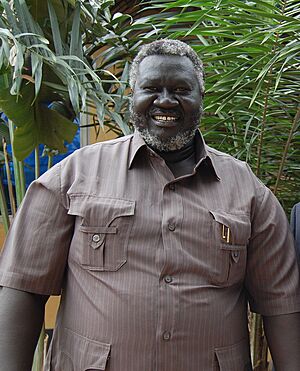Malik Agar facts for kids
Quick facts for kids
His Excellency
Commander General Malik Agar
|
|
|---|---|
|
مالك عقار
|
|

Agar in 2009
|
|
| Vice-President of the Transitional Sovereignty Council | |
| Assumed office 19 May 2023 |
|
| Prime Minister | Abdalla Hamdok Osman Hussein (acting) Dafallah al-Haj Ali (acting) Kamil Idris |
| Chairman | Abdel Fattah al-Burhan |
| Preceded by | Hemedti |
| Member of the Transitional Sovereignty Council | |
| Assumed office 11 November 2021 |
|
| In office 2 February 2021 – 25 October 2021 |
|
| Chairman of the SRF | |
| Assumed office February 2012 |
|
| Chairman of SPLM-N | |
| Assumed office February 2011 |
|
| Governor of Blue Nile State | |
| In office April 2010 – 2 September 2011 |
|
| Personal details | |
| Born |
Nganyofa Agar Eyre Nganyofa
Ingessana Hills, Blue Nile State, Republic of Sudan |
| Political party | SPLM-N |
| Occupation | Politician, soldier |
| Military service | |
| Allegiance | Sudan People's Liberation Movement |
| Years of service | 1983–present |
| Battles/wars | Second Sudanese Civil War Sudanese conflict in South Kordofan and Blue Nile War in Sudan (2023–present) |
Malik Agar (Arabic: مالك عقار, romanized: Mālik ʻAqqār) is a Sudanese politician and former leader of a rebel group. He was involved in the conflict in Sudan's Blue Nile state. Since May 2023, he has been the deputy leader of the Transitional Sovereignty Council. This council is the group that currently governs Sudan.
Early Life and Name
Malik Agar was born Nganyofa Agar Eyre Nganyofa. His family belonged to the Ingessana people in Blue Nile State. He grew up not knowing he was a Muslim. When he was eight, his headteacher told him he was Muslim and gave him the name "Malik." From then on, he was known as "Malik Agar Eyre."
Joining the Conflict
Agar joined the armed opposition in Sudan in 1983. This was shortly after the Second Sudanese Civil War began.
In the 1990s, he became a commander in the Sudan People's Liberation Movement (SPLM). His forces operated near the border between Ethiopia and Sudan. In 1997, units under his command took control of the towns of Kurmuk and Qaissan.
Agar was a close friend of John Garang, who was a key leader in the SPLM. They both wanted to change the government of Sudan. They did not want South Sudan to become a separate country. After Garang passed away, Agar and others who shared his views became less important in the SPLM. In 2009, Agar told a US official that he believed South Sudan becoming independent would cause the rest of Sudan to break apart.
After the Civil War
In April 2010, Malik Agar was elected as the governor of Blue Nile State. He was one of the few opposition leaders to run in that election. He was also the only candidate not from the ruling National Congress Party (NCP) to win a governorship. Agar won against the NCP candidate, Farah Ibrahim Mohamed Al-Aggar, with more votes.
In February 2011, Agar also became the chairman of the Sudan People's Liberation Movement–North (SPLM-N). This part of the SPLM worked in northern Sudan. The southern part of the SPLM became a separate political party. This happened when South Sudan became an independent country in July 2011.
On September 2, 2011, President Omar al-Bashir removed Agar from his position as governor. Agar then went to the southern part of the state. He reportedly planned a counterattack. He warned that the conflict between Sudan and the SPLM could lead to a larger civil war.
In February 2012, Agar helped create the Sudanese Revolutionary Front (SRF). This was a group of different opposition organizations in Sudan. Their goal was to change the Sudanese government and create a democracy. Agar was chosen as the president of the SRF in February 2012.
On February 2, 2021, he was appointed as a member of the Sovereignty Council of Sudan. This council plays a role in governing the country.
His Beliefs
Malik Agar does not agree with former President Omar al-Bashir's idea of Arab-Islamic nationalism. Instead, Agar believes in a government that is secular and multicultural. This means a government that is not based on one religion and respects many different cultures. He supports a civil democracy, where citizens have a say in how they are governed.
See also
 In Spanish: Malik Agar para niños
In Spanish: Malik Agar para niños
 | George Robert Carruthers |
 | Patricia Bath |
 | Jan Ernst Matzeliger |
 | Alexander Miles |

